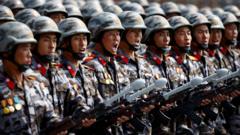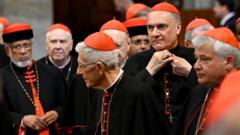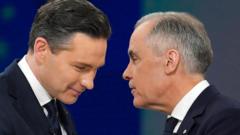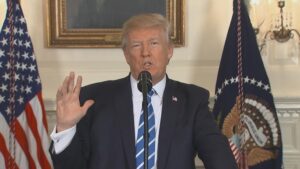This article delves into the forthcoming week as seen through the lens of US Secretary of State Marco Rubio's remarks, Donald Trump's diplomatic overtures, and contrasting perspectives from European leaders regarding potential peace settlements.
Critical Week for US Involvement in Ukraine-Russia Peace Talks, Rubio Attests
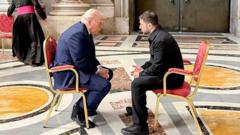
Critical Week for US Involvement in Ukraine-Russia Peace Talks, Rubio Attests
Traction in negotiations may hinge on the dynamics shared by the US, Ukraine, and Russia.
Despite the ongoing conflict in Ukraine, US Secretary of State Marco Rubio has declared that this week could be pivotal for discussions surrounding a resolution to the Russia-Ukraine war. Rubio stated on US media that the Biden administration will assess its commitment to being involved in potential peace negotiations.
In light of a recent meeting between former President Donald Trump and Ukrainian President Volodymyr Zelensky, held shortly before Pope Francis' funeral at the Vatican, Trump expressed his belief that Zelensky may consider ceding Crimea to Russia for peace. This claim stands in stark contrast to Ukraine's longstanding position against yielding any territory. Trump emphasized the importance of making diplomatic overtures, suggesting that stringent sanctions against Russia might hinder ongoing dialogue, reflecting a strategic approach to resolving this multiple-fronted conflict.
On NBC’s "Meet the Press," Rubio characterized the current state of negotiations as both hopeful and realistic, highlighting the delicate balance between optimism and the clear recognition of the challenges that lay ahead. He remarked on the necessity of gauging whether both sides genuinely seek peace and how much ground they have made in the past three months of attempts.
Meanwhile, President Trump has stressed the urgency of the conflict, asserting his doubts on Russian President Vladimir Putin's willingness to cease hostilities, while publicly speculating that Zelensky appeared more amenable during their discussions. Trump’s comments echo a growing concern among American and European officials about the potential for Ukraine to make concessions that some deem could resemble capitulation.
In contrast, German Defense Minister Boris Pistorius urged caution, warning Ukraine against agreeing to arrangements requiring extensive territorial give-ups under the pretext of a ceasefire. He criticized Trump's proposals, which reportedly might accept the legitimacy of Russia's claims over Ukrainian territory, including Crimea, while maintaining that a future negotiation on land should only occur once a ceasefire is established.
Reports suggest that US proposals include recognizing Russian control over specific regions in Ukraine while raising concerns among European countries who demand more potent guarantees of security and territorial integrity for Ukraine, potentially through a NATO-style commitment. There are also ongoing discussions about the control of the Zaporizhzhia nuclear plant to ensure joint electricity distribution between the opposing sides.
As the US weighs its options moving forward, this week will serve as a critical juncture in determining the viability of diplomacy aimed at resolving one of the most consequential conflicts in recent history. Currently, Russia maintains control of nearly 20% of Ukrainian territory since its full-scale invasion in 2022. The potential outcomes of this week's talks may have far-reaching implications for the future of peace and territorial integrity in Eastern Europe.
In light of a recent meeting between former President Donald Trump and Ukrainian President Volodymyr Zelensky, held shortly before Pope Francis' funeral at the Vatican, Trump expressed his belief that Zelensky may consider ceding Crimea to Russia for peace. This claim stands in stark contrast to Ukraine's longstanding position against yielding any territory. Trump emphasized the importance of making diplomatic overtures, suggesting that stringent sanctions against Russia might hinder ongoing dialogue, reflecting a strategic approach to resolving this multiple-fronted conflict.
On NBC’s "Meet the Press," Rubio characterized the current state of negotiations as both hopeful and realistic, highlighting the delicate balance between optimism and the clear recognition of the challenges that lay ahead. He remarked on the necessity of gauging whether both sides genuinely seek peace and how much ground they have made in the past three months of attempts.
Meanwhile, President Trump has stressed the urgency of the conflict, asserting his doubts on Russian President Vladimir Putin's willingness to cease hostilities, while publicly speculating that Zelensky appeared more amenable during their discussions. Trump’s comments echo a growing concern among American and European officials about the potential for Ukraine to make concessions that some deem could resemble capitulation.
In contrast, German Defense Minister Boris Pistorius urged caution, warning Ukraine against agreeing to arrangements requiring extensive territorial give-ups under the pretext of a ceasefire. He criticized Trump's proposals, which reportedly might accept the legitimacy of Russia's claims over Ukrainian territory, including Crimea, while maintaining that a future negotiation on land should only occur once a ceasefire is established.
Reports suggest that US proposals include recognizing Russian control over specific regions in Ukraine while raising concerns among European countries who demand more potent guarantees of security and territorial integrity for Ukraine, potentially through a NATO-style commitment. There are also ongoing discussions about the control of the Zaporizhzhia nuclear plant to ensure joint electricity distribution between the opposing sides.
As the US weighs its options moving forward, this week will serve as a critical juncture in determining the viability of diplomacy aimed at resolving one of the most consequential conflicts in recent history. Currently, Russia maintains control of nearly 20% of Ukrainian territory since its full-scale invasion in 2022. The potential outcomes of this week's talks may have far-reaching implications for the future of peace and territorial integrity in Eastern Europe.



